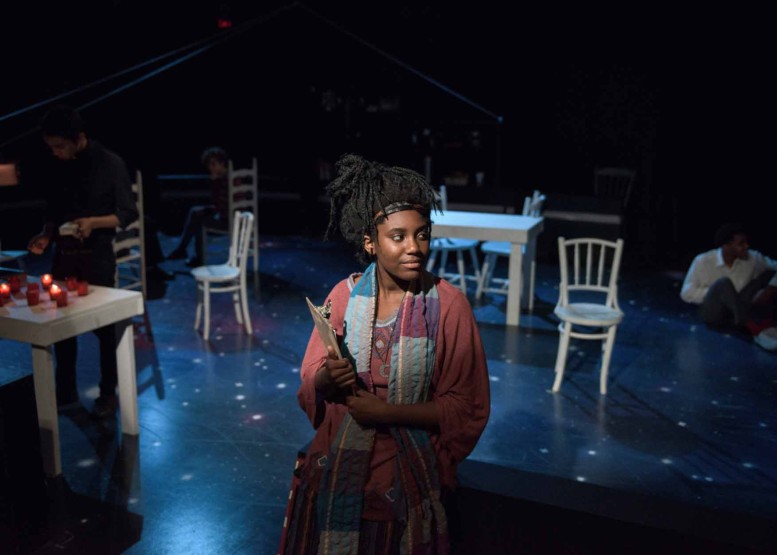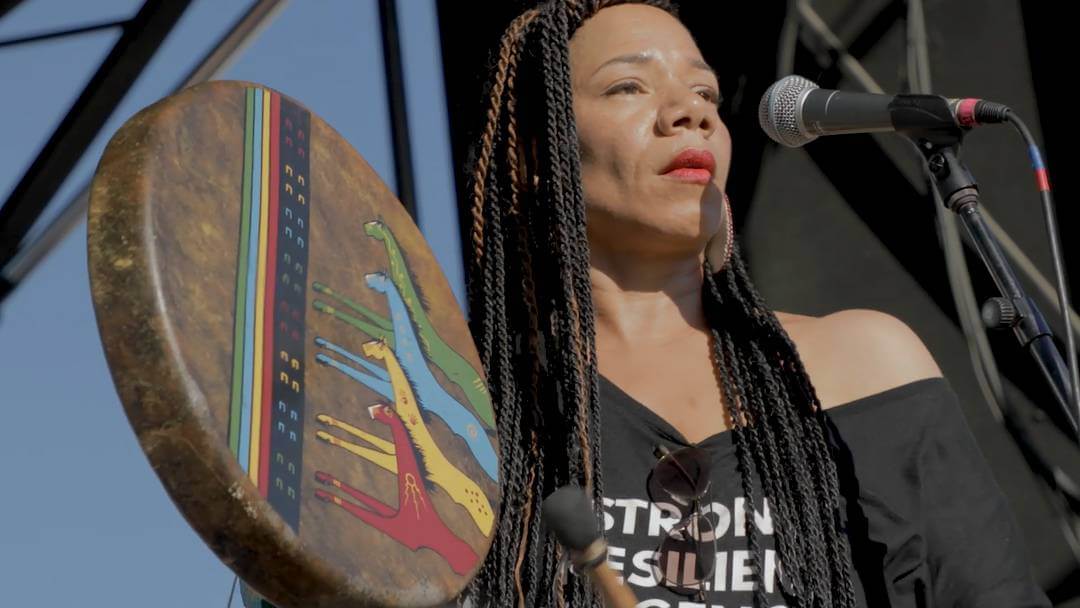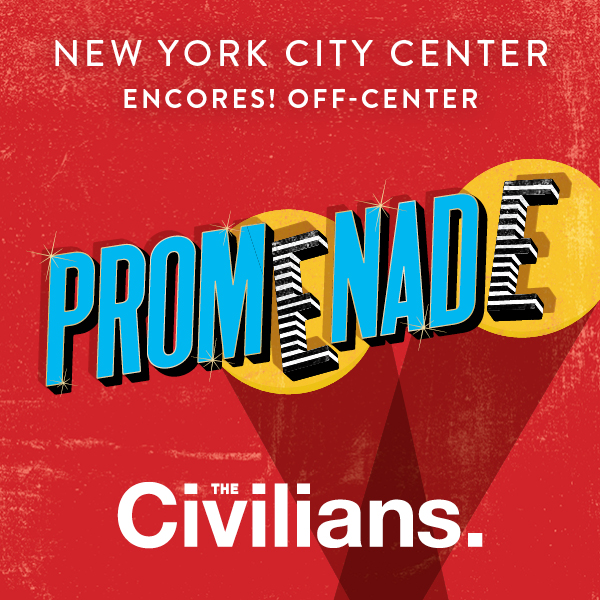Extended Play’s KC Luce recently spoke with three members of the American Theater Company’s Youth Ensemble Max Dizon, Ireon Roach and Olivia Shine. They were joined by director Sonny Das. The Youth Ensemble is a two-year training program, founded by former ATC Artistic Director PJ Paparelli, that works with exceptionally talented high school juniors and seniors who have the ambition to pursue theater at a higher level, and each summer the group performs a piece of documentary theater.
This summer the group presented “This Beautiful City,” an investigative theater piece created by the Civilians from their interviews with members of the Colorado Springs community in 2006, around the time that the Evangelical community was thrown into disarray by the very public outing of Ted Haggard, the founding pastor of New Life Fellowship Association. Ten years later, the ATC Youth Ensemble retraced the Civilians footsteps in preparation for their production of “This Beautiful City” to see how the community has changed and remained the same.
KC LUCE: How long have you guys been working on “This Beautiful City?” I know that’s the show you’re doing this summer, but how long have you spent on this process of making this piece?
IREON ROACH: Just about the summer up until this point. Every summer we do a summer show, which is in a documentary theater style, and this summer “This Beautiful City” was the project…So as soon as everyone’s just about out of school, we start meeting five days a week instead of once a week as we would be doing the school year. At first, it was table work and just sort of reading through the script and like dramaturgy. And asking questions. And then we pick a research group, which we went to Colorado Springs, and then we come back and we start the rehearsal process, with getting on our feet and putting it — putting the show together, so it’s been, it’s been a while, it’s been a few weeks.
KC: Great. Very cool. Talk to me a little bit about your trip to Colorado Springs. What was that like?
OLIVIA SHINE: Aaaaamaaaazing! It’s like, it’s beautiful? And that is it. No, for me as a person who lived in the flattest city, I think, ever, I was just, on the surface, blown away by the terrain. By the beautiful, beautiful mountains. It was just amazing to be in that space and to kind of — for a moment I really understood why it was such a religious place? But when it came to talking to people it was absolutely fascinating and really interesting to talk to people that you guys — you the Civilians — have spoken to and turned out mentioning that you guys took an interview. But also interesting to see how the city has changed since the Civilians came and visited — and since they’ve kind of had this scandal broke out — and I think that was overall one of the most interesting parts of the trip was to see how things have adapted and moved and evolved.
MAX DIZON: For me, the experience was…it had a wide range of different emotional reactions. I mean, you know, being awestruck by the mountains because I’ve only been to Colorado once, but I’d never gotten that close to the Rockies when I was back there. And getting to see Colorado Springs at night from a higher elevation. Absolutely stunning. And it’s getting to see like all these different types of people in this community. It’s very refreshing from what I’m used to here in Chicago, and also spiritually a very fascinating atmosphere.
IREON: For me, it was just sort of — everything they said about like just being in this place, but also — and I think that comes with diving into this place specifically — realizing, well understanding, completely understanding that there are other people in the world. And not everyone that I know, that I will encounter, that thinks the things I do and — the whole world is not Chicago, but it’s very easy to feel that way when you live in such a big city and there are so many ideas around you. But just sort of it get out of this headspace and physical space and just be somewhere else and be completely submerged in other people’s experiences and lives and ideas was very interesting and very, I think, jarring at first.
KC: That’s really exciting.
SONNY DAS: Hey KC, if I could follow up for a second?
KC: Yeah, please!
SONNY: Can you guys talk a little about where we visited when we were there? Who we spoke to? And who we spoke to in Colorado Springs, and who we got a chance to speak to here in Chicago?
KC: You’ve actually jumped right to my next questions, so that’s great!
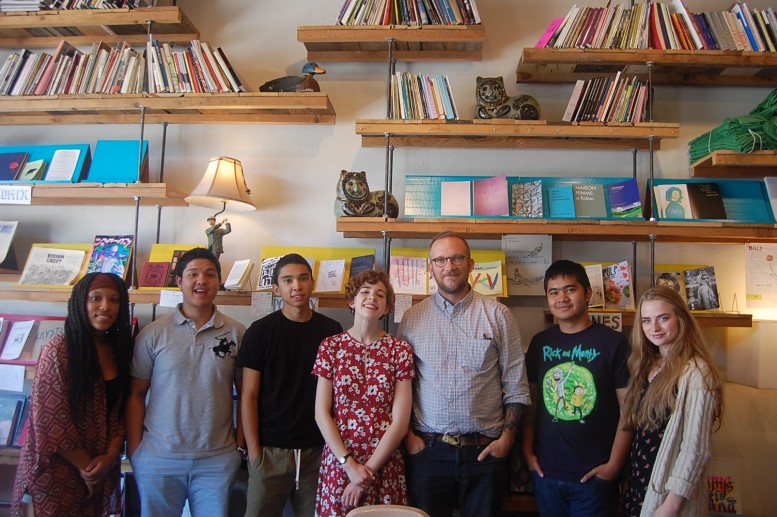
OLIVIA: We met with Noel Black at Mountain (Fold Books) who is a writer who is one of the characters that I’m playing. And that was so interesting. It’s always interesting to meet somebody that you’re gonna be portraying onstage…for a lot of reasons. And that was interesting in the sense that — not that I expected that he would be the way — like not that I like matched right my expectations exactly matched when I met him? But it was pretty similar…it’s so weird, he just said the exact things that he says in monologues that I have to read onstage, which was so fascinating.
KC: Ireon, I have two questions: did your entire group speak to the same people, or did you guys kind of break out and talk to different people? And can you speak to your experience with the research trip and, and the interviews that you guys did?
IREON: So as far as everyone speaking to the same people, I think we tried to do that as much as possible. For the most part, we tried to meet everyone together. We went to New Life (Fellowship Association), we spoke with Pastor Joe and got sort of a tour of New Life. And I think that, for me, was that that — visiting New Life Church and visiting Emmanuel Baptist Church the next morning was very — I don’t want to say interesting, because we create this thing with the word interesting — but it was very — I’m just gonna explain it ’cause I don’t know the word. New Life…so it was pretty empty. Some people were there setting up for the next service and all that. And it did not feel very church-y to me. It felt like a super stadium. Like Beyonce was gonna perform that night or something. It just didn’t feel like a church home in the sense that I’ve experienced church homes, which was this community and emotional bonding. It felt like people come there to listen to a person speak on that huge stage and then they go home. That’s what it felt like. And then Emmanuel Baptist — which I grew up in Baptist churches — felt very much…I would not be surprised if a few of them would live there. Like it felt very homey. Just watching these people that we were speaking to sort of define their spirituality I think was most interesting because I have trouble doing that myself. But watching them sort of find their place in a community that was, until that point, defined by a person, and sort of watching that person fall in whatever sense of the word — and figuring out what that means for you.
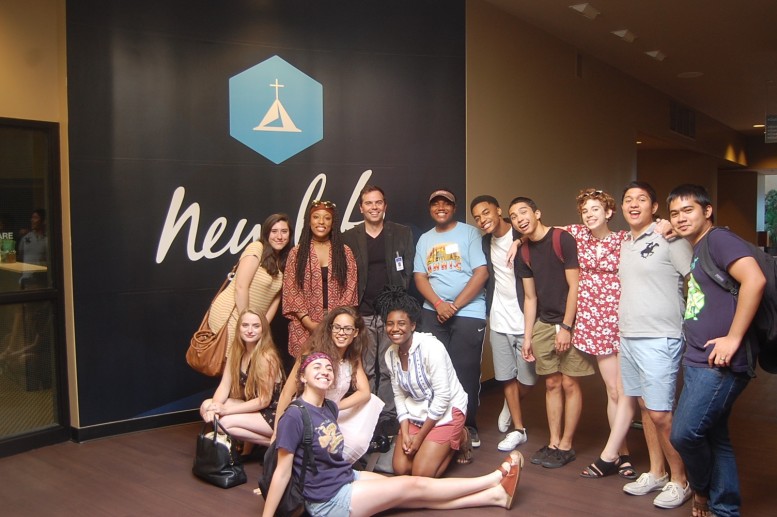
MAX: I actually got to meet one of my characters. (he laughs) I got to meet Mikey Weinstein…about two weeks ago. The conversation with him with him was, I think, fantastic. Even though it was it was mostly him just kind of going on multiple different tangents after I would ask, like, a small question. I was kind of getting annoyed because he wouldn’t stop talking…but at the same time, I’m just like, “He’s answering all my questions before I even ask them.” He’s an attorney, so, of course, he’d talk a lot. But talking with Weinstein, that was an amazing experience, to say the least, I, think to see his perspective and why he had such a harsh rhetoric.
KC: How did meeting Mikey Weinstein inform the choices that you made as you were portraying him?
MAX: When I just read through his monologues, I was just thinking he’s — I was thinking that he’s a good demonstration of the horseshoe effect, which means that whether you’re a — consider yourself left-wing or right-wing, no matter what issue you’re talking about…your stances are gonna be different, but your approaches are gonna be the same. And I thought that he would be like a left-wing equivalent of someone like Donald Trump. But when I met him and when I had that discussion with him, he — he wasn’t as harsh as I took him to be when I first read the monologue. There was still that sense…like he had a grudge and there’s still that sense of bitterness against religious conservatives, but he had a very good reason to be so harsh, considering that he was in the military and in that sort of world the only way to have your voice be heard is to scream as loud as possible and hit things.
KC: Ireon and Olivia, did you have the chance to meet any of the people you’re portraying?
OLIVIA: Yeah. I’m playing Alt Writer, so…I met Noel Black —
KC: Right.
OLIVIA: — at his coffee shop, Mountain Fold. And, yes, I think what I mentioned was reading the monologues. You get a certain picture of a person in your head, but it was so funny because I was expecting to be proved wrong by whatever I formulated. But when I met him…it was so cool to talk about — to hear specific lines that are that are in the script and things that I say — and hear him just say those without me prompting them, it was like “Ah! There it is!” When it comes to playing any real person that you meet, there’s all kinds of like challenges when it comes to the fine line of what’s mimicking? What’s not mimicking? And what’s doing justice to this real human being and what isn’t? For me, that was what I was navigating the most after meeting him.
IREON: I didn’t meet specifically meet anyone that I play. I play “the fairness” — like Coloradans for Fairness and Equality, a worker for that like political company?
KC: Sure.
IREON: I play the new pastor at Emmanuel. I got to speak with a few members about sort of the history of that and the member that we spoke to actually was there for Benjamin Reynolds in the transition that the church has gone through, of switching buildings and having a building on the polar opposite side of the city. And also getting the new pastor. Once we got back to Chicago, though, we spoke with Benjamin Reynolds because he’s in Chicago now.
KC: Oh, great.
IREON: And talking to him and sort of comparing and contrasting this retelling the history of Emmanuel, which was very interesting, because upon reading the monologue of the new pastor it seemed like, especially just with the words, you know, “new pastor,” with that term, there’s just this man who is you know, a pastor, a reverend of some sort, who is experienced obviously, and had just come into this church to sort of pick them up and just keep it going. When I found out from Ben that — Cleveland Thompson is his name — he had been sort of conditioned by Benjamin Reynolds, he was Benjamin’s mentee…in a sense that he had known Benjamin way before his announcement. And, I don’t know, it just put more into perspective about the sermon itself and sort of where I felt like this pastor reconciled with and had a conversation with Benjamin. Because he never specifically speaks out against his actions. It’s more of, “Don’t let this distract you no matter what your feelings toward him may be because you are in control of what happens next.” So it’s a more of a pick-me-up than a put Benjamin down. And just knowing that he (Benjamin) grew up in that church and how close he is to the community of that church, which I spoke on before, is very much a community. It is a family. It was hard to believe that they would just remove him and kick him out but — I now had a better understanding of that sermon which was, I can’t, as a pastor, I cannot spew hate at Benjamin Reynolds because he is Benjamin Reynolds. So I can’t spew hate. I do not know how to approach this situation, and I don’t know where my spiritual self and where my personal self — you know, knowing Ben Reynolds — I don’t know where they meet. But I do know that I can control what happens to the church.
KC: I watched your Kickstarter video, and I saw you were asking the question: “What does it mean to be an American?” I was curious, how you think “This Beautiful City” answers that question? Or, at least, speaks to that question.
MAX: I feel like “This Beautiful City” tackles so many different angles of the question because with the concept of “What does it mean to be an American?” so many things can get brought up in that conversation. There’s race, there’s sexuality, there’s gender identity, there’s class, there’s, yeah, there’s religion. There’s all these different things and so a lot of those are involved with “This Beautiful City.” And like it’s also the fact that the political climate that takes place in the show is very relevant to things going on right now. Now that same-sex marriage has been legalized, and the gay rights being very strong. But now there’s this whole fiasco with transgender-inclusive bathrooms and there’s so many — there are a lot of parallels between like the bathroom fiasco and the marriage fiasco in Colorado Springs. That eventually spread throughout the entire world. So “This Beautiful City” is like a taste of how history does tend to repeat itself and how it might be with different issues. But we’re still approaching them the same exact ways as before. And the same exact things are being said in different conversations.
IREON: I think “This Beautiful City” answers the question what it means to be American by just having a — the play is a conversation between, as Max mentioned, so many things that are existing in the world. And what’s cool about it is no matter how frustrating the fight gets in the play or in my mind or in the world outside of the play, it’s really cool that there is this fight and a conversation to be had. That’s liberating to know that we don’t just have to take it. Like one side doesn’t just have to take anything. I think that’s the beautiful part of it, is coming into contact with people who do not think the same way that you do, because if everyone thought the same way that I did that would just be the most boring thing ever. It’s almost impossible, especially today with social media and so many just minds being expanded and lives being broadcast to everyone else. It’s very hard to just sit back and be apathetic and be hands off. Because if you are hands off, you are suspicious first of all, but it’s just very hard to not have an opinion and then voice it. And that’s what it means to be an American. To have your opinion. Voice it. And see what other people have to respond.
Author
-
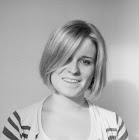
KC Luce is an arts administrator and dancer based in New York. She has worked as a fundraiser with the Civilians, Signature Theatre, Roundabout Theatre Company and Rattlestick Playwrights’ Theater and dances with ChEckiT!Dance. She is a graduate of Muhlenberg College and originally hails from the Philadelphia area.


